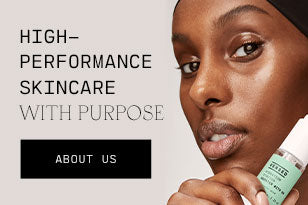
Meet Polyglutamic Acid: The Ingredient That Works 4x Harder Than Hyaluronic Acid
The harder to pronounce, the more effective the ingredient. It’s not an adage people actually say, but in the case of polyglutamic acid (among bakuchiol, tranexamic acid, and squalane), it is a true one.
While polyglutamic acid is somewhat new to the skincare scene, it answers many of the questions we’ve been contemplating for years, such as “how to hydrate skin without feeling dry seconds later” and the “best way to get a more dewy, natural glow.” It's also found in our new Moisture Maker Hydrating Hyaluronic Serum. With help of dermatologist Dr. Factor, we give a deep dive on polyglutamic acid (and the best ways to use it) below.
WHAT IS POLYGLUTAMIC ACID?
“Polyglutamic acid is a water-soluble polypeptide (long chains of amino acids, the building blocks of proteins such as collagen and elastin),” says Dr. Factor. Specifically, “polyglutamic acid, originally used for healing wounds, is made from chains of the amino acid [called] glutamic acid. Unlike some moisture boosters that penetrate the skin, polyglutamic acid is a larger molecule that sits on top.”
You can also add polyglutamic acid to the long list of humectants we often find in moisturizers and oils, such as hyaluronic acid, glycerin, bamboo extract (found in our Hydrating Milk Toner), lactic acid, and snow mushroom. Like other humectants, polyglutamic acid pulls moisture from the air to hydrate skin’s surface and the layers beneath it.
THE BENEFITS OF POLYGLUTAMIC ACID
Polyglutamic acid’s biggest claim to fame is its hydrating powers, specifically the ability to hold 4000 times its weight in water (that’s 4 times more than hyaluronic acid—the most iconic hydrating ingredients out there…for now). “The primary benefit of polyglutamic acid and other humectants is keeping your skin moist by drawing moisture from the atmosphere into the upper layers of your skin,” agrees Dr. Factor. “A 2015 research review found that polyglutamic acid can increase your body’s production of the following natural moisturizing factors: carboxylic acid, lactic acid, pyrrolidone, and urocanic acid. They are all naturally produced by the body and keep skin hydrated by locking in moisture.”Because of these hydrating abilities, polyglutamic acid is an ideal ingredient to add to your routine if you want to strengthen—or repair—skin’s moisture barrier, which has its benefits in itself (softer texture, less irritation, and fewer breakouts—just to name a few). And because it slowly absorbs into skin, it can deliver a bouncy, dewy glow, too. Polyglutamic acid can “increase luminosity, like a natural highlighter,” Dr. Factor agrees. That’s precisely why we added this peptide to our Luminizing Glow Drops, which enhance skin’s natural radiance and softly blur pores.
Use polyglutamic acid if any of these are on your list of skin goals:
- Hydrated, soft skin
- Strengthened moisture barrier
- Dewy, bouncy texture
- Less visible fine lines and pores
HOW AND WHEN TO APPLY POLYGLUTAMIC ACID
According to Dr. Factor, polyglutamic acid is similar in profile to other humectants like hyaluronic acid, meaning it's best for dry and dehydrated skin but can benefit all complexions. It’s gentle—so even sensitive skin can enjoy it without fear of irritation or redness—and pregnancy-safe, too.
As a peptide, it plays well with all other ingredients. Moisture Maker pairs polyglutamic acid with hyaluronic acid, two hydrating powerhouses for those looking for plumper, more hydrated skin that attracts and retains moisture over time. It’s especially helpful when combined with retinol since its moisturizing properties can counteract the vitamin A derivative’s drying side effects. (Or you can use our Gentle Retinol Serum and Retinol Body Lotion, whose encapsulated retinol is naturally non-drying.)
To get the most out of polyglutamic acid, apply daily. Because it doesn’t make skin more sensitive to the sun, it can be used morning and/or night.
Looking for more dry skin remedies? Read up on one of our other favorites: Squalane.






